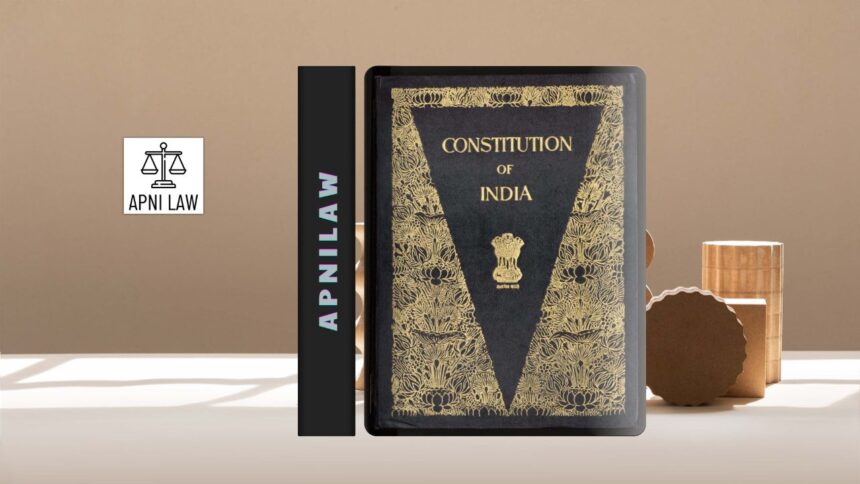Introduction
Not only the form of government but also who is a part of the country as a citizen is defined by the Indian Constitution. The basis for enjoying the rights and discharging duties under the Constitution is citizenship.Part II of the Constitution, Articles 5 to 11, addresses citizenship. These provisions came into effect on January 26, 1950.These provisions were crafted in an era of immense uncertainty after Independence and Partition, when issues of identity, nationality, and belonging were at the centre of the political agenda. These Articles were temporary in character but are extremely important for comprehending the legal framework of Indian citizenship.
Why Were These Provisions Needed?
The draftsmen of the Constitution were presented with a remarkable situation. India became independent in 1947 but was also traumatized by Partition, which led to mass migrations across India and Pakistan. Millions of individuals migrated across borders for safety and stability. This created complex questions about who would qualify as a citizen of India. Indians migrated to Pakistan but wanted to return, and individuals of Indian origin abroad wanted to retain a connection with the newly free country. In order to solve these problems and prevent a legal vacuum, the Constituent Assembly enacted Articles 5 to 11, which established definite parameters of citizenship at the time of the initiation of the Constitution.
What Do Articles 5 to 11 Say?
Article 5: Citizenship at the Commencement
Article 5 stated who would be a citizen of India at the time of the initiation of the Constitution. It conferred citizenship on all individuals who were resident in the Indian territory and met one of the following conditions: they were born in India, or one or both of their parents were born in India, or they had been present in India for at least five years continuously prior to January 26, 1950. This clause ensured that persons with a permanent home and strong connection with India became citizens automatically.
Article 6: Migrants from Pakistan
Article 6 dealt with the rights of Pakistan migrants, which was important after Partition. It gave citizenship to all those who had migrated to India prior to July 19, 1948, if they or their parents or grandparents were born in India. Anyone who arrived after this date had to register themselves under the law for obtaining citizenship. This was important to control the huge number of refugees who arrived during those times.
Articles 7 and 8: Returnees and Overseas Indians
Article 7 addressed those who migrated to Pakistan from March 1, 1947, and returned later to India. Such people could be made citizens only if the law allowed them to settle again. It was done to ensure national safety and avoid repetition of migrations during a politically volatile period.
Article 8 granted the right of citizenship to Indians living abroad, as long as they or their parents or grandparents were born in India. They could enroll as citizens at an Indian consulate where they were living. This provision proved the liberal spirit of the Constitution and acknowledged the close cultural and historical connection of the Indian diaspora.
Articles 9 to 11: No Dual Citizenship and Parliament’s Power
Article 9 stated that India did not accept dual citizenship. Any individual who acquired foreign country citizenship voluntarily would lose their Indian citizenship. This ensured sole loyalty to India and avoided legal complications due to mixed allegiance.
Article 10 assured that all individuals who were Indian citizens at the moment of the commencement of the Constitution would remain so, as long as Parliament did not pass any law with regard to this. This provided for legal continuity and stability for the transition from colonial rule to a sovereign republic.
Lastly, Article 11 provided Parliament with the power to legislate the acquisition and loss of citizenship by law. This resulted in the passage of the Citizenship Act, 1955, which remains in force currently, governing issues related to citizenship in India, with amendments made to address modern-day challenges.
Historical Significance of These Articles
The importance of these Articles cannot be emphasized enough. They answered pressing questions of nationality in the midst of political turmoil, avoided anarchy, and made millions of individuals not remain stateless. The provisions demonstrate India’s devotion to unity and inclusiveness, but also protect national integrity. They also show the concept of single citizenship in the whole nation, as opposed to federal countries like the United States wherein states may accord their own citizenship. This ruling reinforced the feeling of national solidarity in a newly independent nation torn apart by profound social and political cleavages.
Judicial Interpretation
The courts have had a significant role to play in interpreting them. In Izhar Ahmad Khan v. Union of India (1962), the Supreme Court took into consideration the rights of those who migrated at the time of Partition and interpreted the extent of Articles 6 and 7. In Abdul Kader v. State of Assam (1961), the Court also specified the grounds upon which migrants could be granted Indian citizenship under Article 6. These judgments reflect the continued applicability of these provisions in outlining the boundaries of citizenship.
Modern Relevance and Contemporary Debates
While Articles 5 to 11 were meant to be transient, citizenship is a much controversial topic in India even today. The recent debates over the Citizenship Amendment Act (CAA), debates relating to illegal migration, and the launch of schemes such as Overseas Citizenship of India (OCI) reveal that nationality and belonging issues continue to provoke high levels of sentiment. The no dual citizenship policy continues in effect. However, schemes like OCI and PIO allow people of Indian origin to maintain a connection with India without full citizenship rights.The provision under Article 11 giving Parliament the authority to enact laws has allowed the framework of citizenship to change over time.
What is the Relationship Between Citizenship and Fundamental Rights
Citizenship is more than a mere legal term; it is the door to the fundamental rights of the Constitution. Certain rights like those under Articles 15, 16, 19, and 29 exist only for citizens, such as the right to equality of opportunity in public employment and freedom of speech and expression. While doing this, citizenship also involves obligations such as loyalty to the Constitution, respect for the nation’s symbols, and the cultivation of harmony, as listed under Article 51A.
Conclusion
Articles 5 through 11 of the Indian Constitution are one of the most essential elements in the legal system of the nation. These endowed a clear-cut, structured method to decide citizenship at the time of the inception of the Constitution with room left for future legislation. These provisions effectively navigated the nuances of Partition, unified millions of citizens into the new political framework, and set a foundation for a contemporary law of citizenship. In the present day, the legacy of these Articles lives on in the Citizenship Act of 1955 and the heated debates surrounding nationality, identity, and belonging. An appreciation of these provisions is necessary in order to understand the vision of the framers and the time-tested principles that frame Indian citizenship.
For any specific query call at +91 – 8569843472








